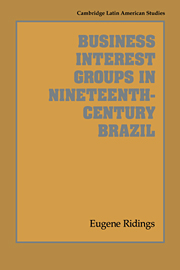Book contents
- Frontmatter
- Contents
- Acknowledgments
- Abbreviations and Usage
- Value of the Mil-reis against the Dollar and the Pound
- Brazil, with cities
- Introduction
- 1 The Genesis of Brazilian Business Interest Groups
- 2 Leadership and Organization
- 3 Influence, Ideology, and Public Relations
- 4 The Export Economy: Agricultural Quality, Markets, and Profits
- 5 The Export Economy: Banking, Credit, and Currency
- 6 The Export Economy: Manpower
- 7 Taxation
- 8 Industrialization
- 9 Communications: Regionalism Perpetuated
- 10 Port Areas and Harbors: Efficiency and Rivalry
- 11 Business Interest Groups and Economic and Urban Integration
- 12 Business interest groups and the Republic
- 13 Conclusion
- Bibliography
- Index
8 - Industrialization
Published online by Cambridge University Press: 27 October 2009
- Frontmatter
- Contents
- Acknowledgments
- Abbreviations and Usage
- Value of the Mil-reis against the Dollar and the Pound
- Brazil, with cities
- Introduction
- 1 The Genesis of Brazilian Business Interest Groups
- 2 Leadership and Organization
- 3 Influence, Ideology, and Public Relations
- 4 The Export Economy: Agricultural Quality, Markets, and Profits
- 5 The Export Economy: Banking, Credit, and Currency
- 6 The Export Economy: Manpower
- 7 Taxation
- 8 Industrialization
- 9 Communications: Regionalism Perpetuated
- 10 Port Areas and Harbors: Efficiency and Rivalry
- 11 Business Interest Groups and Economic and Urban Integration
- 12 Business interest groups and the Republic
- 13 Conclusion
- Bibliography
- Index
Summary
Brazil's business interest groups played a major part on both sides of the struggle for industrialization. This reflected the central role of the Brazilian state in industrial development and the particularly strong advisory prerogatives on state aid to industry enjoyed by business interest groups. They derived from the presence in group ranks of both industrialists and importers, those businessmen most affected by government measures to foster manufacturing. Most contention was over the protective tariff, then considered the sine qua non for promoting industrial development. Although substitution for handicrafts was part of Brazilian industrialization, the core of that process, as in many underdeveloped nations, was import substitution theoretically promoted by tariffs. Basic to the struggle over government aid was the battle for the minds of Brazil's educated elite. It would ultimately determine the state's role.
The strength and pervasiveness of Brazil's long-standing import economy implied a dearth of manufacturing. Imports included not only complex manufactures but basic goods otherwise readily producible at home. Bricks were brought in from Germany and salt from Portugal. Travelers often remarked on the ubiquity of European consumer goods. They encountered English beverages deep in the Amazon region and in the west of the Province of Bahia, an area remote even today, “Tennant's Ale, Huntley and Palmer's biscuits, Swedish matches, pyretic saline, American and French patent medicine, Birmingham and Sheffield hardware, Staffordshire china ware, and Manchester's goods.”
As a colony, Brazil's economic relationship with its mother country had been determined by the mercantile system. Colonies functioned as exporters of primary goods to the mother country and importers of its consumer goods.
- Type
- Chapter
- Information
- Business Interest Groups in Nineteenth-Century Brazil , pp. 202 - 233Publisher: Cambridge University PressPrint publication year: 1994



